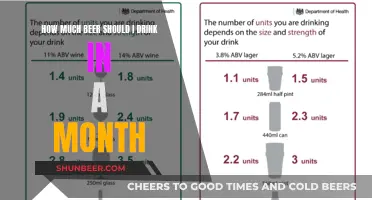
Drinking alcohol is not recommended immediately after gallbladder removal surgery. However, once you have recovered, you may be able to resume drinking in moderation. The gallbladder is a small, pear-shaped organ located beneath the liver, which stores and releases bile, aiding in the digestion of fats. While the gallbladder is part of the digestive system, it does not play a role in metabolising alcohol. Instead, alcohol is processed mainly by the liver, with the help of the enzyme alcohol dehydrogenase.
| Characteristics | Values |
|---|---|
| Drinking alcohol after gallbladder surgery | It is recommended to avoid alcohol initially after the surgery, but moderate drinking may be acceptable after recovery. |
| Alcohol metabolism | Alcohol metabolism mainly occurs in the liver with the help of the enzyme alcohol dehydrogenase. |
| Alcohol and gallstones | Excessive alcohol consumption can contribute to the development of gallstones. |
| Alcohol and gallbladder inflammation | Alcohol-induced inflammation can harm the gallbladder and disrupt its normal function, leading to complications such as cholecystitis. |
| Adjusting alcohol consumption after gallbladder surgery | It is important to start slowly, choose drinks wisely, practice moderation, stay hydrated, and listen to your body's response. |
| Alternative strategies for socializing | Explore non-alcoholic options, focus on the company, participate in alcohol-free events, and educate others about your decision to limit alcohol consumption. |
| Diet after gallbladder surgery | It is recommended to follow a balanced diet rich in fruits, vegetables, whole grains, high-fiber foods, and lean proteins, while limiting saturated fats, refined sugars, and processed foods. |
What You'll Learn

It is recommended to avoid alcohol after gallbladder surgery
After surgery, the digestive system needs to reorganise how it functions. Bile, produced by the liver, is no longer stored in the gallbladder but is instead released directly into the small intestine. This may affect alcohol digestion while the body adjusts. Structural changes to the digestive system, such as gallbladder removal, can also cause small intestinal bacterial overgrowth (SIBO). SIBO is characterised by an excessive number of bacteria in the gut, leading to symptoms such as stomach pain, nausea, vomiting, and diarrhoea.
Additionally, heavy alcohol consumption can increase the risk of acute pancreatitis and alcohol-related liver disease, which are closely linked to gallbladder issues. Alcohol-induced inflammation can disrupt the gallbladder's normal function, leading to complications such as cholecystitis (inflammation of the gallbladder). It can also cause inflammation in the gut, as large amounts can be challenging for the gut to process, leading to an inflammatory response that can extend throughout the body.
Furthermore, excessive alcohol consumption can reduce gallbladder motility, impairing the proper emptying of bile. This can lead to bile stasis and increase the risk of gallstone formation. Therefore, it is advisable to avoid alcohol after gallbladder surgery to mitigate these risks and allow the body to heal and adjust to the structural changes.
Beer and Crohn's Disease: What You Need to Know
You may want to see also

Alcohol is not processed by the gallbladder
While the gallbladder and alcohol don't have a direct relationship in terms of processing, there is an indirect connection. Excessive alcohol consumption can negatively impact the gallbladder's functioning and overall health. Regular and heavy drinking can lead to the development of gallstones, which are hardened deposits that form in the gallbladder. Alcohol can also cause inflammation, disrupting the gallbladder's normal function and leading to complications such as cholecystitis (inflammation of the gallbladder). Additionally, alcohol can interfere with the normal emptying of the gallbladder, resulting in a buildup of bile and cholesterol, which can increase the risk of gallstone formation.
It's important to note that moderate alcohol consumption, defined as up to one drink per day for women and up to two drinks per day for men, is generally considered safe and may even offer some protective effects against gallstones. However, heavy or excessive drinking can increase the risk of gallbladder-related issues, including gallstone formation, inflammation, and other complications.
After gallbladder removal surgery, it is generally recommended to avoid alcohol initially. However, in the long term, moderate drinking is usually well-tolerated. It is important to consult with a healthcare professional for personalized advice, as individual tolerances and health statuses may vary.
Beer and Heartburn: Tums to the Rescue?
You may want to see also

Excessive alcohol consumption can lead to gallstones
Alcohol is a drug that can slow down the messages transmitted between the brain and the body. It can cause short-term effects like hangovers, as well as long-term health problems. Excessive alcohol consumption can negatively impact both your physical and mental health. It can also increase your risk of accidents, violence, and crime. Even if you feel fine after drinking, alcohol can impair your concentration, judgment, and reaction time.
In addition to gallstones, excessive alcohol consumption can also increase the risk of pancreatitis, an inflammation of the pancreas. Pancreatitis can lead to gallstone formation due to alterations in bile composition and flow. Furthermore, alcohol-induced inflammation can disrupt the gallbladder's normal function, leading to complications such as cholecystitis, an inflammation of the gallbladder.
Excessive alcohol consumption can also reduce gallbladder motility, impairing the gallbladder's ability to contract and release bile efficiently. This reduced gallbladder function can further contribute to bile stasis and increase the risk of gallstone formation. Therefore, it is crucial to drink in moderation and avoid excessive alcohol consumption to maintain gallbladder health and reduce the risk of gallstone formation and other related complications.
Beer and Meclizine: Is It Safe to Drink Alcohol?
You may want to see also

Drinking alcohol after gallbladder removal may cause digestive issues
Drinking alcohol after gallbladder removal surgery requires careful consideration of potential effects and adjustments to your alcohol consumption habits. While the absence of a gallbladder does not imply complete abstinence from alcohol, it is crucial to exercise caution and moderation. Here are some reasons why drinking alcohol after gallbladder removal may cause digestive issues:
Digestive Upset
The gallbladder stores and releases bile, which is crucial for the digestion of fats. Without a gallbladder, the flow of bile may be altered, and the body may have difficulty processing alcohol efficiently. This can result in digestive discomfort, such as bloating, gas, nausea, abdominal pain, or diarrhea. These symptoms may be more noticeable after consuming fatty or greasy foods, which can further exacerbate digestive issues.
Increased Sensitivity
The absence of the gallbladder can lead to increased sensitivity to alcohol. The altered bile flow and changes in digestion can cause individuals to feel the effects of alcohol more quickly and intensely. This may result in symptoms such as dizziness, lightheadedness, impaired coordination, or memory loss, even with smaller amounts of alcohol than before the surgery.
Liver Strain
Excessive alcohol consumption can strain the liver, which plays a crucial role in metabolizing alcohol and detoxifying harmful substances. Without a gallbladder, individuals may be at increased risk of liver complications if they consume alcohol excessively or regularly. Liver inflammation, fatty liver disease, hepatitis, and cirrhosis are all potential consequences of chronic alcohol abuse.
Weight Management
Changes in weight or body composition after gallbladder removal can impact alcohol tolerance and metabolism. Weight gain or obesity can increase the risk of complications related to alcohol consumption, including liver disease, diabetes, cardiovascular disease, and certain types of cancer. Maintaining a healthy weight through a balanced diet and regular exercise is crucial for mitigating these risks.
Medication Interactions
Individuals who have undergone gallbladder removal may be taking medications to manage post-surgical symptoms or other health conditions. Alcohol can interact with certain medications, such as pain relievers, antibiotics, antidepressants, or sedatives, increasing the risk of adverse reactions or side effects.
It is important to listen to your body and monitor how alcohol affects you after gallbladder removal surgery. If you experience any adverse symptoms or discomfort, it is advisable to consult with a healthcare professional for personalized guidance and recommendations.
Beer and Cannabis: Safe Consumption Explored
You may want to see also

Alcohol may cause gallbladder inflammation
Heavy alcohol consumption is associated with an increased risk of gallbladder disease, including gallstones and cholecystitis. Gallstones are hardened deposits of cholesterol and bile that form in the gallbladder. Alcohol can interfere with the normal emptying of the gallbladder, leading to a buildup of bile and cholesterol that can solidify over time. This buildup can cause intense abdominal pain, nausea, and other discomforting symptoms.
Additionally, alcohol-induced inflammation can disrupt the gallbladder's normal function, further increasing the risk of cholecystitis. Excessive alcohol consumption can also reduce gallbladder motility, or the ability of the gallbladder to contract and release bile efficiently. This reduced function can lead to bile stasis and increase the risk of gallstone formation.
Furthermore, heavy alcohol consumption can increase the risk of pancreatitis, an inflammation of the pancreas. Pancreatitis can lead to complications affecting the gallbladder, as gallstones can move from the gallbladder and block pancreatic enzymes from reaching the small intestine.
While moderate alcohol consumption may not directly cause gallbladder inflammation, heavy or excessive drinking can increase the risk of developing gallbladder-related issues. It is important to drink in moderation and be aware of the potential risks associated with excessive alcohol consumption.
The Beer Bug Mystery: How Does It Work?
You may want to see also
Frequently asked questions
It is recommended to avoid alcohol initially after gallbladder surgery, but moderate drinking may be acceptable after recovery. It is important to consult with a healthcare professional for personalized advice.
Alcohol can negatively impact the gallbladder, increasing the risk of gallstones and inflammation. It can interfere with the normal emptying of the gallbladder, leading to a buildup of bile and cholesterol, which can solidify into gallstones.
Symptoms may include abdominal pain, nausea, vomiting, bloating, indigestion, and jaundice.
Yes, there are several alternatives to consider, such as exploring non-alcoholic options like mocktails and alcohol-free beers, focusing on the company and engaging in conversations that don't involve alcohol, participating in alcohol-free events, and educating others about your experience and reasons for limiting alcohol consumption.
It is important to start slowly and observe how your body reacts. Choose drinks that are lower in fat content and practice moderation. Stay hydrated by drinking plenty of water, and listen to your body, adjusting your consumption if any discomfort or digestive issues arise.







